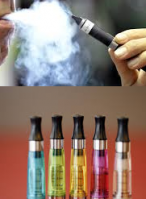
By Miriam Raftery
Calls to poison control centers due to electronic cigarettes have risen sharply, the Centers for Disease Control reports. First marketed in the U.S. in 2007, e-cigarettes now account for nearly 42% of all cigarette-related calls to poison control centers.
E-cigarettes are battery-powered devices that deliver nicotine and flavorings via an inhaled aerosol, a practice also known as “vaping.” Thus far, these are not regulated by the Food & Drug Administration and in many states, there are no restrictions on sales of e-cigarettes to minors—though they can cause acute nicotine toxicity.
The CDC study tracked calls from September 2010, when poison control centers added new codes for e-cigarette calls, through February 2014.
E-cigarette calls soared from just one in September 2010 to 215 in February 2014. In addition, more of the e-cigarette poisoning calls were coming from health care facilities. Alarminingly, over half of e-cigarette poisonings or exposures reported were in children 5 years old or younger, and 42% of cases were among young people under age 20.
The poisonings including inhalations, eye exposures, skin exposures, and ingestions. The impacts were also more severe from e-cigarettes than cigarettes – with nearly 58% of the callers reporting adverse health effects after exposure, compared to 36% for regular cigarette exposures.
The most common adverse health effects from e-cigarette exposure were vomiting, nausea and eye irritation. One death was reported – a suicide from an individual who injected nicotine liquid intravaneously.
The CDC indicates this analysis might have underestimated the total number of e-cigarette exposures, since some poison control operators may not have known about the new codes initially. Also calls may be increasing as awareness of e-cigarette hazards among the public and medical professional increases.
As little as a teaspoon of liquid nicotine could make a child violently ill. Even spilling liquid nicotine on a child’s skin could result in nicotine toxicity, Richard Clark, medical director at the California Poison Control Centers in San Diego has warned. Yet liquid nicotine is not sold with child-proof caps.
The CDC wants the public to know that e-cigarettes can cause acute adverse health effects and represent an emerging public health concern.







Comments
Nicotine is an Insecticide !